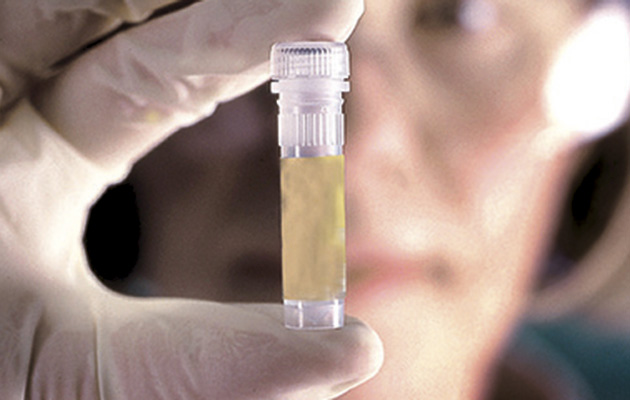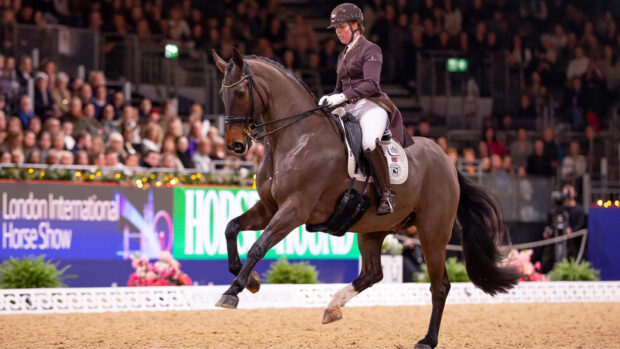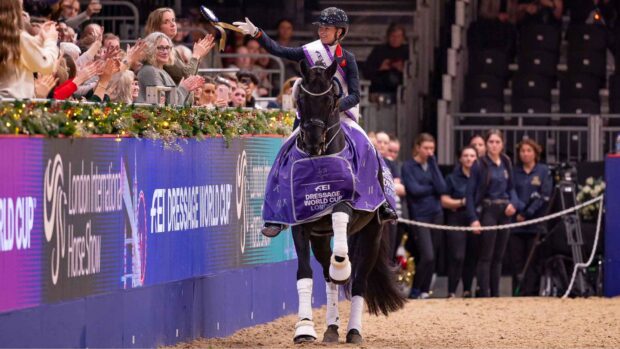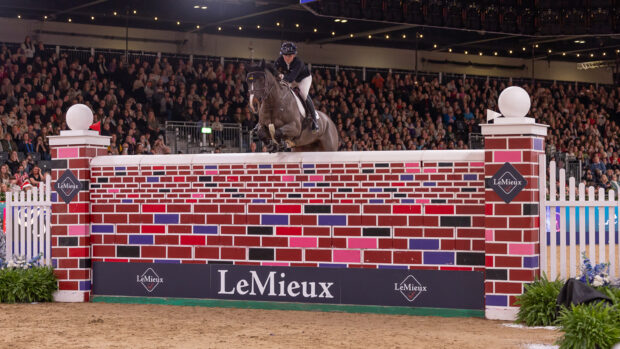The rider of a horse who tested positive for a banned painkiller believes the result was caused by the horse’s licking a member of show staff during a prizegiving ceremony.
The FEI Tribunal has banned Swiss showjumper Nadja Peter Steiner for two years, after her ride Saura De Fondcombe tested positive for painkiller o-desmethyltramadol, the major metabolite of tramadol and a prohibited substance.
The then 11-year-old mare was tested at a CSI3* event in Morocco, in October 2017. Another test five days later was negative.
Nadja told the panel that after she had won the grand prix at the show, she had to hand the horse over to a member of the organising committee (OC) for the duration of the prizegiving, some 20 to 30 minutes. There was a picture taken during this time showing the horse licking the staff member’s hand, which Nadja believes is the source of the contamination.
The rider also pointed out that the show was held on a military base with no access to the public and that she had tried to obtain water samples and contact the person pictured, but without success. The organisers’ response was that personnel had no contact with competition horses, which was “clearly not true, as evidenced by the picture”.
“Moreover, the PR submitted that even if she managed to identify the person on the picture, in accordance with the culture in Morocco that person would never have admitted taking tramadol and thus having caused a positive finding, or have admitted anything which would put the Morocco Royal Tour which was ‘under the patronage of King Mohammed IV of Morocco’ under a negative image,” reads the Tribunal report.
“She therefore submitted that the staff at the event were not properly instructed nor supervised by the organising committee to avoid contact with the competition horses.
“She had to hand over the horse and the horse stood behind her during the prizegiving ceremony. This situation was not under her control, and she therefore bore no fault or negligence for the positive finding.”
The rider also pointed out her “impeccable reputation” over her 14 years of registration with the FEI, that horse welfare is her top priority and that tramadol is not used in her yard.
The FEI’s external expert professor Stuart Paine said it is plausible the level of the drug could have been caused by contamination, and potential sources of this were water supplies, handling horses and urinating in stables.
But the FEI highlighted that “a low concentration does not necessarily indicate contamination”, as there are low concentrations during elimination of the substance.
The federation added that there was no evidence of anyone taking tramadol being near the horse, nor evidence of water supplies being high in tramadol concentration at the site.
“In the FEI’s view, contamination of the water supply would most likely have caused other positives at the event, which was not the case,” the report adds.
The FEI said the rider had not established the source of the drug, and that it was her responsibility to ensure no banned substances were present.
Continues below…

Owner’s hairspray causes showjumper’s positive dope test
The rider and the owner’s wife were unaware he was using the product

Human sewage to blame for horse’s positive dope test
The horse’s rider has been cleared of any wrongdoing in the contamination case

Subscribe to Horse & Hound magazine today – and enjoy unlimited website access all year round
“Despite the difficulty in equestrian sport to keep control over what the horse ingests and in addition to have full control at all times, [Court of Arbitration for Sport] law has confirmed that the [rider] is in the best position to have this control and naturally also the person to have strict liability in relation to a positive finding in the horse,” the report reads.
Nadja argued that even the FEI “seemed to have problems” contacting the show organisers, asking the federation to ensure shows do not put riders in such positions. She said she had no choice but to hand her horse to the staff member, when it would normally be her groom who took this role.
“In her view the fact the organising committee was not cooperating in the present case meant that they had to have something to hide,” the report reads. “The OC’s reaction spoke for itself and was a strong indication that the person in the picture was using tramadol.”
But the FEI said no irregularities were reported from the show. The panel pointed out that none of the other horses in the prizegiving, also held by staff, tested positive, and ruled that Nadja had not proved her case.
She was suspended for two years, fined 7,500 Swiss francs (£6,131) and ordered to pay 2,000 francs (£1,634) in costs.
Would you like to read Horse & Hound’s independent journalism without any adverts? Join Horse & Hound Plus today and you can read all articles on HorseandHound.co.uk completely ad-free




